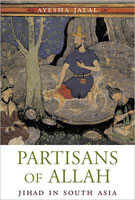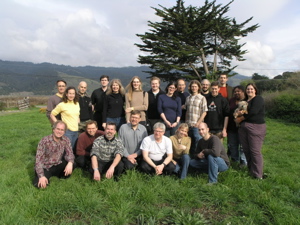Mediawatch World Apr 06: Zakaria on Benazir, Meditation, Ayesha Jalal, Israel-Iran, Internet Archive, Child Psychology, Dalai Lama
Also, like most western reviewers of Benazir Bhutto's period in office, he too has been lax and "charitable" - almost glossing over in a hurry. Read on:
Picture the moment. It is Dec. 2, 1988. A beautiful woman, 35 years old, walks into the presidential palace in Islamabad, Pakistan’s capital, flanked by liveried and turbaned honor guards. She is wearing a green silk tunic and a white gauzy shawl that barely covers her hair. She speaks flawless Urdu and English, her English perfected as an undergraduate at Radcliffe and then as a student at Oxford, where she was president of the Oxford Union. She is intelligent, erudite and intensely charismatic. And she is about to take the oath of office to become the first woman in history to lead a modern Muslim country.

Benazir Bhutto taking the oath of office as prime minister of Pakistan, 1988.
If you have ever suffered from anxiety and depression, as I have, then you will know how hard it can be to feel hopeful. The mind wanders toward catastrophe; it fixates on menace. Anxious and depressed people gravitate toward worst-case scenarios in a well-documented phenomenon that psychologists describe as “paying selective attention to threat.” There may be good news out there, indeed a whole array of marvelous and happy stirrings in the world, but we don’t notice. We see the dark. Under the circumstances, you may not think there could be any good news to relay about the subject of mood disorders themselves, but there is. The good news for those of us so-afflicted is that neuroscientists are discovering that unhappy minds can heal themselves. Meditate your way to happiness - Patricia Pearson
Tufts Journal: How did you come to write a book about jihad?
In my previous book, Self and Sovereignty: Individual and Community in South Asian Islam since 1850, I made an analytical distinction between religion as a demarcator of identity—an assertion of social difference with others—and religion as a matter of faith, something that is personal, ethical, about what you believe in, and that there is a difference between the two. The wars between Muslims and Hindus during the final decades of British rule, for example, were not necessarily driven by religious doctrine; they were political battles, battles of identity.

After I finished writing that book, I thought that I hadn’t really talked much about religion as faith. Pursuing it made me realize that the concept of jihad—which means effort, endeavor in the positive sense, against something negative—was intrinsic to faith. That’s when I realized that this much-abused and much-misused term needed a systematic historical study. I’ve argued in Partisans of Allah that jihad is an ethical concept, insofar as its literal meaning is to strive to attain the high ethical ideals of Islam. It is often said that one is not born a Muslim; you become one through a constant struggle to be human. The Greater Jihad - By Taylor McNeil
Last month the Swiss foreign minister visited Iran and, together with President Ahmadinejad, attended the signing of a multi-billion euro contract for Iran to supply Switzerland with large amounts of natural gas over the next 25 years. The US State Department immediately condemned the deal and said it would be investigating whether it breached the Iran Sanctions Act. Israel complained too, describing the Swiss minister's visit to Tehran as an "act unfriendly to Israel". Various Jewish groups also joined in the protests, including the World Jewish Congress. This righteous indignation was entirely predictable but more than a little odd nevertheless. On March 30, the Swiss newspaper Sonntag retaliated with the revelation that Israel, supposedly observing an ironclad boycott of all things Iranian, has been buying Iranian oil for years. [thanks YA] Israel's Tehran connection - Richard Silverstein
One hack that I'm fond of—but have failed at—is the efficient idea that every e-mail you send should be five sentences or fewer. Outside my inbox, brief writing is thriving with the publication of Not Quite What I Was Planning, an anthology of six-word memoirs. Amusing examples abound ("Most successful accomplishments based on spite"), and more than a few have a melancholy kick ("He left me for good eventually"). Wired editor Kevin Kelly points out the boomlet in brief-review sites, such as The Four Word Film Review and Paul Ford's six-word music reviews. But none of these match the wit of their more long-winded ancestor, the Guardian's The Digested Read. When you need to skewer a pretentious book in six paragraphs, only an Englishman will do. The Great Uncluttering - By Michael Agger
Insulted, spat at and attacked -- by ordinary Germans. Unable to bear the daily racism, a pastor's family fled from a small town in eastern Germany back to the their former home in the west. Sometime last year, Miriam Neuschäfer, who has dark skin because her mother is Indian, decided it was time to record the daily instances of racism she and her family were suffering. The 32-year-old mother of five and wife of a German clergyman wrote down her encounters with the citizens of Rudolstadt, a small town in the eastern German state of Thuringia. "It helped me work through it," she says, "and some day I want the children to understand everything that happened to us." Family Escapes Small Town Xenophobia - By Philipp Wittrock
 [thanks YA] The Internet Archive is a 501(c)(3) non-profit that was founded to build an Internet library, with the purpose of offering permanent access for researchers, historians, and scholars to historical collections that exist in digital format. Founded in 1996 and located in the Presidio of San Francisco, the Archive has been receiving data donations from Alexa Internet and others. In late 1999, the organization started to grow to include more well-rounded collections. Now the Internet Archive includes texts, audio, moving images, and software as well as archived web pages in our collections. [thanks YA] About the Internet Archive
[thanks YA] The Internet Archive is a 501(c)(3) non-profit that was founded to build an Internet library, with the purpose of offering permanent access for researchers, historians, and scholars to historical collections that exist in digital format. Founded in 1996 and located in the Presidio of San Francisco, the Archive has been receiving data donations from Alexa Internet and others. In late 1999, the organization started to grow to include more well-rounded collections. Now the Internet Archive includes texts, audio, moving images, and software as well as archived web pages in our collections. [thanks YA] About the Internet ArchiveWhen you think of your kids and money, what's the first thing that comes to mind? Okay, yes, they are expensive. What's the second thing? Perhaps your mind turns to allowance and, by extension, how kids learn to earn money, spend it and save it. If your children are older, you may be thinking about how they will eventually earn it when they join the workforce. Money concepts begin to develop when a certain level of cognitive readiness paves the way for numeracy, learning how to count and recognize denominations of money. As soon as kids are old enough to consciously observe their parents' spending habits, they begin to form similar impressions of the value of money. Essentially, what kids need to learn about saving money, making it grow and spending it wisely begins at home Child psychology - by Melanie Barwick
Do you get the impression that the Dalai Lama is not exactly the brightest bulb in the room?” a journalist asked Pico Iyer after both men left a speaking event by His Holiness. We know what he’s getting at. At a certain angle, the chirpy aphorisms, the generous stream of book forewords, the Hollywood entourage, all conspire to cast a hue of superficiality that few global pop icons escape. His Holiness the Dalai Lama at the Gyume Tantric Monastery, Kamataka, India, Jan. 6, 1998. In that light, it is possible to forget that the Dalai Lama is, in fact, a titan: a head of state, a doctor of metaphysics, a prolific author, a hyperrealist, a newshound, a godhead to the Tibetan people and the recipient of the Nobel Peace Prize — a man who embodies a “simplicity that lies not before complexity but on the far side of it.” In “The Open Road,” Iyer takes a long, hard look at the many meanings of this deceptively simple man. At first blush, one might wonder why Iyer, best known as the author of many travel memoirs including “Video Night in Kathmandu” and “Sun After Dark,” would take on such a subject. The answer lies in the understanding that Iyer is not just a travel writer, and the Dalai Lama is not just a monk Searching for the Dalai Lama
Haaretz columnist Sayed Kashua on Wednesday was shortlisted along with seven other authors for one of the world's most valuable prizes for a single work of fiction in English. Kashua, an Arab Israeli, writes a satirical weekly column for Haaretz, and has published two novels. Two other Arab authors were among those shortlisted on Wednesday for the award.
The International IMPAC Dublin Literary Award - set up 13 years ago to underline the Irish capital's importance as an artistic centre - is worth 100,000 euros Haaretz columnist Sayed Kashua shortlisted for int'l literary award .
HONG KONG, China (CNN) -- It is said that nowhere else on earth will the impacts of climate change be felt more acutely than in the developing world. Workers leave the Gobi desert after a day of afforestation work in Yinchuan, China. And within the developing world, no-one else will be more vulnerable to these changes than the rural dweller. More than 3 billion people live in the rural areas of the developing world; amongst them three quarters of the world's poorest, and three quarters of the world's hungry. There are many problems they face, but with relation to climate change the key problems are pretty fundamental: where they live and how they live. According to the Intergovernmental Panel on Climate Change (IPCC), the weather-related impacts of climate change will largely be played out in the lower latitude regions of the world, where much of the world's rural poor live. All about: Rural communities - Rachel Oliver
Paul Jay from RealNews Presents
|



0 Comments:
Post a Comment
<< Home